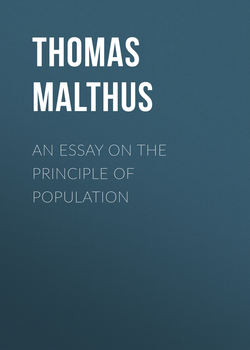An Essay on the Principle of Population

Реклама. ООО «ЛитРес», ИНН: 7719571260.
Оглавление
Thomas Malthus. An Essay on the Principle of Population
Preface
CHAPTER 1
CHAPTER 2
CHAPTER 3
CHAPTER 4
CHAPTER 5
CHAPTER 6
CHAPTER 7
CHAPTER 8
CHAPTER 9
CHAPTER 10
CHAPTER 11
CHAPTER 12
CHAPTER 13
CHAPTER 14
CHAPTER 15
CHAPTER 16
CHAPTER 17
CHAPTER 18
CHAPTER 19
Отрывок из книги
The great and unlooked for discoveries that have taken place of late years in natural philosophy, the increasing diffusion of general knowledge from the extension of the art of printing, the ardent and unshackled spirit of inquiry that prevails throughout the lettered and even unlettered world, the new and extraordinary lights that have been thrown on political subjects which dazzle and astonish the understanding, and particularly that tremendous phenomenon in the political horizon, the French Revolution, which, like a blazing comet, seems destined either to inspire with fresh life and vigour, or to scorch up and destroy the shrinking inhabitants of the earth, have all concurred to lead many able men into the opinion that we were touching on a period big with the most important changes, changes that would in some measure be decisive of the future fate of mankind.
It has been said that the great question is now at issue, whether man shall henceforth start forwards with accelerated velocity towards illimitable, and hitherto unconceived improvement, or be condemned to a perpetual oscillation between happiness and misery, and after every effort remain still at an immeasurable distance from the wished-for goal.
.....
These two laws, ever since we have had any knowledge of mankind, appear to have been fixed laws of our nature, and, as we have not hitherto seen any alteration in them, we have no right to conclude that they will ever cease to be what they now are, without an immediate act of power in that Being who first arranged the system of the universe, and for the advantage of his creatures, still executes, according to fixed laws, all its various operations.
I do not know that any writer has supposed that on this earth man will ultimately be able to live without food. But Mr Godwin has conjectured that the passion between the sexes may in time be extinguished. As, however, he calls this part of his work a deviation into the land of conjecture, I will not dwell longer upon it at present than to say that the best arguments for the perfectibility of man are drawn from a contemplation of the great progress that he has already made from the savage state and the difficulty of saying where he is to stop. But towards the extinction of the passion between the sexes, no progress whatever has hitherto been made. It appears to exist in as much force at present as it did two thousand or four thousand years ago. There are individual exceptions now as there always have been. But, as these exceptions do not appear to increase in number, it would surely be a very unphilosophical mode of arguing to infer, merely from the existence of an exception, that the exception would, in time, become the rule, and the rule the exception.
.....